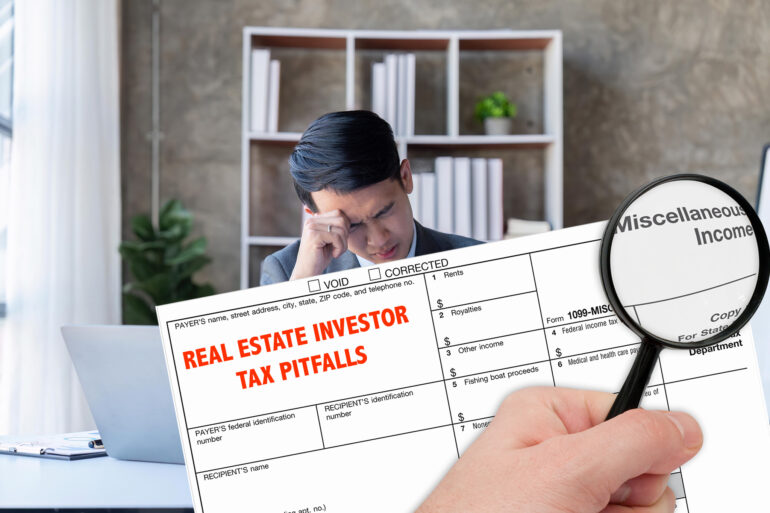Real Estate Investor Tax Pitfalls
Real estate investment is a popular way for people to grow their wealth and generate income. Florida is a particularly attractive market, in part, because of our welcoming tax laws. It’s no wonder that since the start of the pandemic over 600,000 individuals have left traditional blue states to move to Florida.
However, real estate investors in Florida face unique tax pitfalls that can significantly impact their profits. In this article, I will discuss five of the most common tax pitfalls that Florida real estate investors face and provide tips on how to avoid them.
Unfortunately, many real estate investors fail to take into account property taxes and property tax increases when calculating their expenses and expected profits.
1. Failure to Plan for Property Taxes
One of the most significant tax pitfalls that Florida real estate investors face is failing to plan for property taxes. In Florida, property taxes are a significant source of revenue for local governments. Property owners are required to pay taxes based on the value of their property, which can be a substantial amount of money.
Unfortunately, many real estate investors fail to take into account property taxes and property tax increases when calculating their expenses and expected profits. This can lead to financial difficulties, especially if property taxes from the prior owner were assessed at a homestead discount rate or if a vacant parcel has been improved.
To avoid this tax pitfall, real estate investors should research valuation trends for property taxes in the area where they plan to invest. They should take advantage of the appraiser’s tax calculators to factor the increase in property taxes with non-homestead, improvements, and construction into their budgets and ensure that they have enough cash flow to cover these expenses.
Additionally, real estate investors should consider timely appealing their property tax assessment to the county’s value adjustment board if they believe the assessment is too high. The time to appeal is governed by Florida law. At the time of this writing, property owners only have 25 days from the date the assessment notice is mailed to taxpayers to petition the value adjustment board.
The type of lodging is irrelevant. Rental sales tax can apply to hotel rooms, condos, timeshares, single-family homes, mobile homes, camping sites, and trailer parks.
2. Not Understanding Florida’s Sales Tax Laws
Another tax pitfall that Florida real estate investors face is not understanding Florida’s sales tax laws. In Florida, there are many different types of sales taxes, including sales tax on rental properties. Real estate investors who do not understand these laws may be liable for additional taxes, penalties, and interest.
To avoid this tax pitfall, real estate investors should educate themselves on Florida’s sales tax laws. They should work with a tax professional who can help them understand their tax obligations and ensure that they comply with state and local laws.
One common misunderstanding is thinking that residential property is never subject to rental sales tax. However, Florida’s 6% state sales tax, plus any applicable discretionary sales surtax, applies to rental charges or room rates paid for the right to use or occupy living quarters or sleeping or housekeeping accommodations for rental periods that are six months or less. The type of lodging is irrelevant. It can apply to hotel rooms, condos, timeshares, single-family homes, mobile homes, camping sites, and trailer parks. Rental charges or room rates paid by a person who entered into a bona fide written lease for continuous residence for a period longer than six months are exempt, which is why it is so important to have well-written leases for all residential properties.
Failing to keep accurate records can result in overpayment of federal income taxes or underpayment of those taxes, both of which can be costly.
3. Failure to Keep Accurate Records
Real estate investors who fail to keep accurate records can face significant tax consequences. In Florida, real estate investors are required to keep detailed records of all income and expenses related to their properties. This includes records of rent payments, maintenance expenses, repairs, and renovations.
Failing to keep accurate records can result in overpayment of federal income taxes or underpayment of those taxes, both of which can be costly. Additionally, inaccurate records can lead to audits, fines, penalties, and interest on those amounts!
To avoid this tax pitfall, real estate investors should keep detailed records of all income and expenses related to their properties. They should also keep receipts and other documentation to support their records. They should separately itemize improvements versus repairs since those are subject to very different tax treatment under Federal law. Finally, they should work with tax professionals, like bookkeepers and CPAs, who can help them keep and categorize accurate records and ensure that they follow tax laws.
Real estate investors who do not understand Florida’s homestead exemption may miss out on significant tax savings.
4. Not Understanding Florida’s Homestead Exemption
Florida’s homestead exemption is a tax benefit that provides property owners who use one Florida property as their principal residence with a reduction in property taxes and with a cap on future increases on assessments. However, not all property owners are eligible for this benefit, there are specific requirements that must be met, and the benefit can be lostby the property owner based on facts and circumstances.
Real estate investors who do not understand Florida’s homestead exemption may miss out on significant tax savings and may be surprised by significant tax consequences resulting from the prior owner’s behavior. Additionally, real estate investors who falsely claim the homestead exemption can face penalties and fines. These penalties are no joke: 50 percent of the unpaid taxes for each year and 15 percent interest per year for each non-qualifying year.
To avoid this tax pitfall, real estate investors should educate themselves on Florida’s homestead exemption. They should research the title of the property they are seeking to add to their portfolio for red flags, like “homestead tax liens.” They should also be extra careful with a property where the owners are estates. Once a person dies, the appraiser can recategorize it as non-homestead for tax purposes and significantly change the tax liability on the property. Finally, investors should work with a property tax professional who can help them determine if they are eligible for this benefit and ensure that they are in compliance with the law.
Real estate investors who fail to plan for these taxes may find themselves with a smaller profit than they expected, or no profit at all.
5. Not Understanding the Tax Implications of Selling Real Estate
Finally, real estate investors who do not understand the tax implications of selling real estate can face significant tax consequences. Florida real estate sales are subject to capital gains taxes, which can be a substantial amount of money.
Additionally, the sale of a rental property may be subject to depreciation recapture taxes, which are taxes that are applied to the depreciation that an investor claimed on the property during the time that they owned it.
Finally, FIRPTA withholdings should not be ignored. When sellers of real estate are foreign nationals (not US citizens or US residents), Federal law requires the buyer to withhold 15% of the amount realized on the sale and remit it to the US Department of the Treasury.
Real estate investors who fail to plan for these taxes may find themselves with a smaller profit than they expected, or no profit at all if the properties were mortgaged. Additionally, real estate investors who incorrectly report the sale of their properties can face fines and penalties.
To avoid this tax pitfall, real estate investors should always inquire as to the legal status of the Seller(s), they should plan with their tax professional for any depreciation recapture taxes, and they should identify potential ways to defer capital gains taxes, such as through the use of 1031 exchanges.
In short, by being aware of how local, state, and federal taxes affect real estate investments, investors can protect their profit margin and ensure the long-term viability of their business.








